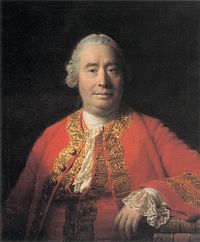User blogs

DAVID HUME (1711-1776), Scottish empiricist philosopher, historian, and economist, founder of modern skepticism
1. In 1745, in his famous letter to John Coutts (Lord Provost of Edinburgh), David Hume wrote:
“Wherever I see Order, I infer from Experience that there, there hath been Design and Contrivance. And the same Principle which leads me into this Inference, when I contemplate a Building, regular and beautiful in its whole Frame and Structure; the same Principle obliges me to infer an infinitely perfect Architect, from the infinite Art and Contrivance which is display'd in the whole Fabrick of the Universe.” (See Hume 1977, 120; A Letter From a Gentleman to His Friend in Edinburgh).
2. In the Introduction to his book The Natural History of Religion (1757), Hume stated: “The whole frame of nature bespeaks an intelligent Author; and no rational enquirer can, after serious reflection, suspend his belief a moment with regard to the primary principles of genuine Theism and Religion.” (Hume 1956, 21).
3. In The Natural History of Religion (1757), Hume wrote: “Were men led into the apprehension of invisible, intelligent Power by a contemplation of the works of nature, they could never possibly entertain any conception but of one single Being, who bestowed existence and order on this vast machine, and adjusted all its parts, according to one regular plan or connected system. …All things in the universe are evidently of a piece. Every thing is adjusted to every thing. One design prevails throughout the whole. And this uniformity leads the mind to acknowledge one Author.” (Hume 1956, 26).
4. “The order of the universe proves an omnipotent Mind.” (Hume 1978; Treatise, 633n).
